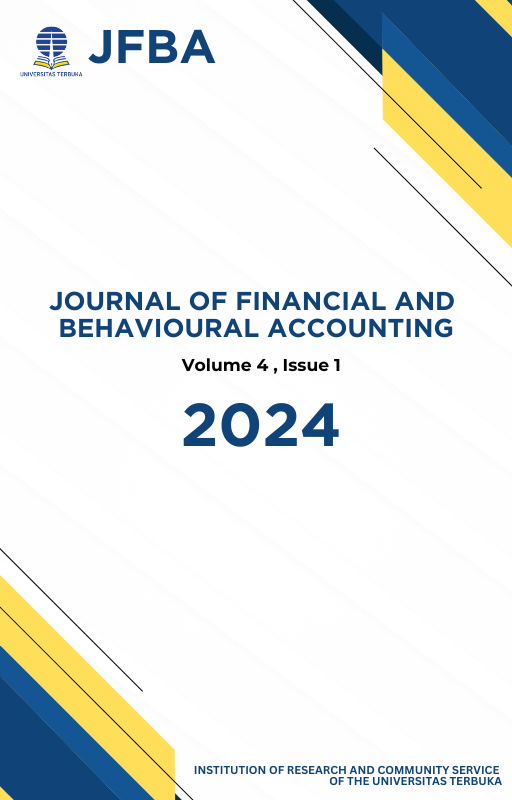The Influence of the Implementation of Regional Government Information Systems and Internal Government Control Systems on the Quality of Financial Reporting
DOI:
https://doi.org/10.33830/jfba.v4i1.9816.2024Keywords:
Internal Control System of the Governmen, Financial Statement Quality, Local Government Information SystemAbstract
This study aims to (1) explain the implementation of the Regional Government Information System (SIPD), the Government Internal Control System (SPIP), and the Quality of Financial Reports (KLK); (2) assess the impact of the implementation of SIPD on KLK; and (3) evaluate the effect of the implementation of SPIP on KLK. This study uses the Partial Least Squares (PLS) method in Structural Equation Modeling (SEM) with WarpPLS 8.0 software, involving 128 respondents. The research findings show that (1) the majority of Regional Government Work Units support the implementation of SIPD and SPIP to improve KLK; (2) the implementation of SIPD has a positive and significant effect on KLK; and (3) the implementation of SPIP also has a positive and significant effect on KLK.
References
Azhar, Susanto. 2003. Sistem Informasi Manajemen. Edisi ke 2. CV. Lingga Jaya. Bandung.
Bergman, M., & Lane, J.-E. (1990). Public Policy in a Principal – Agent Framework. Journal of Theoretical Politics, 2(3), 339–352. https://doi.org/doi.org/10.1177/0951692890002003005.
Bodnar, G.H., dan W.S. Hopwood, 2004, Accounting Information Systems, 9th ed., New Jersey: Prentice-Hall Inc.
Coso. 2002. (http://www.bursa-investasi.tripod.com.id),di akses 2 Maret 2011
Dewi & Mimba.2014. Pengaruh Efektivitas Penerapan Sistem Informasi Pengelolaan Keuangan Daerah (SIPKD) Pada Kualitas Laporan Keuangan. E-Jurnal Akuntansi, Universitas Udayana. 8(3), Hal. 442–457
Furqan, A. C., Wardhani, R., Martani, D., & Setyaningrum, D. (2020). The effect of audit findings and audit recommendation follow-up on the financial report and public service quality in Indonesia. International Journal of Public Sector Management. 33(5), hal. 535–559
Ghozali, I. (2016). Desain Penelitian Kuantitatif dan Kualitatif Untuk Akuntansi, Bisnis, dan Ilmu Ghozali, I., & Latan, H. (2014). Partial Least Squares Konsep, Metode dan Aplikasi Menggunakan
Program WarpPls 5.0 (Third). Semarang: Badan Penerbit Universitas Diponegoro
Governmental Accounting Standards Boards (GASB) 1999. Oncepts Statement No. 1: Objectives of Financial Reporting in Governmental Accounting Standards Boards Series Statement No. 34: Basic Financial Statement And Management Discussionand Analyisis for State and Local Government. Norwalk.
Hevesi, G. Alan. (2005). Standards for Internal Control in New York state Government.
Hutapea, Parulian dan Nurianna Thoha. (2008). Kompetensi Komunikasi Plus: Teori, Desain Kasus dan Penerapan untuk HR dan Organisasi yang Dinamis, Gramedia Pustaka Utama, Jakarta
Indrayani & Widiastuti, 2020. Pengaruh Sitem Akuntansi Keuangan Daerah, Pemanfaatan Teknologi Informasi, Komitmen Organisasi Terhadap Kualitas Informasi Laporan Keuangan Pemerintah Daerah Kabupaten Lombok Tengah.Jurnal Reviu Akuntansi dan Bisnis Indonesia, Prodi Akuntansi Fakultas Ekonomi dan Bisnis Universitas Muhammadiyah Yogyakarta. 4(1).
Jensen & Meckling. 1976. The Theory of The Firn: Manajerial Behaviour, Agency Cost, and Ownership Structure, Journal of Financial and Economics, 3, 305-360
Mardiasmo. (2009). Akuntansi Sektor Publik edisi kedua. Yogyakarta: Andi Yogyakarta.
Naida, N. (2024). Implementation Government's Internal Control System on the Quality Financial Reporting Which Moderate by Human Resource Competency. ARTOKULO: Journal of Accounting, Economic and Management, 1(2), 166-171.
Naida, N., Amir, A. M., Din, M., A, M. I., & Karim, F. (2023). The Effect of Implementing Local Government Information System on the Quality of Local Government Financial Reports Moderated by Human Resource Competence. Journal of World Science, 2(8), 1123–1129. https://doi.org/10.58344/jws.v2i8.390
Noe, Raymond A ( 2002). Employee Training and Development. Second Edition. New York: McGraw- Hill Irwin.
Republik Indonesia, Undang-Undang Nomor 17 Tahun 2003 tentang Keuangan Negara
-------------------, Undang-Undang Nomor 23 Tahun 2014 tentang Pemerintah Daerah
-------------------, Peraturan Pemerintah Nomor 56 Tahun 2005 tentang Sistem Informasi Keuangan Daerah
-------------------. Peraturan Pemerintah Nomor 60 Tahun 2008 tentang Sistem Pengendalian Intern Pemerintah
-------------------, Peraturan Pemerintah Nomor 71 Tahun 2010 tentang Standar Akuntansi Pemerintahan
-------------------, Peraturan Pemerintah Nomor 12 Tahun 2019 tentang Pengelolaan Keuangan Daerah
-------------------, Peraturan Menteri Dalam Negeri Republik Indonesia Nomor 70 Tahun 2019 Tentang Sistem Informasi Pemerintahan Daerah
-------------------. Peraturan Menteri Dalam Negeri Nomor 77 Tahun 2020 tentang pedoman teknis pengelolaan keuangan daerah
Streim, H. (1994). Agency problems in the legal political system and supreme auditing institutions. Eur. JL & Econ., 1, 177.
Sugiyono, 2012. Metode penelitian kuantitatif kualitatif dan R&B. Bandung: Alfabeta Sugiyono, 2015. Metode Penelitian Kuantitatif, Kualitatif, R dan D. Bandung: Penerbit Alfabeta Suliyanto. (2006). Metode Riset Bisnis. Jakarta: Andi Offset.
Santoso, U. dan Y. J. Pambelum. 2008. Pengaruh Penerapan Akuntansi Sektor Publik terhadap Akuntabilitas Kinerja Instansi Pemerintah dalam Mencegah Fraud. Jurnal Administrasi Bisnis. 4(1):14-33.
Watts, R. L., & Zimmerman, J. L. (1983). Agency Problems, Auditing, and The Theory of The Firm: Some Evidence. The Journal of Law and Economics, 26(3), 613-633.
Werther, W & Davis, K 1996, Human resources and personnel management, New York: McGraw-Hill, Inc.
Widjajanto, Nugraha. 2001. Sistem Informasi Akuntansi. Erlangga. Jakarta.
Winarno, W. W. 2006. Sistem Informasi Akuntansi. Edisi Kedua. STIE YKPN. Yogyakarta Wilkinson, J. W., Cerullo, M. J., Raval, V., and Wong-On-Wing, B. 2000. Accounting Information
System: Essential Concepts and Applications. New York: John Wiley & Sons. Inc.
Wilopo.2006. Analisis Faktor-Faktor yang Berpengaruh terhadap Kecenderungan Kecurangan Akuntansi: Studi pada Perusahaan Publik dan Badan Usaha Milik Negara di Indonesia. Simposium Nasional Akuntansi 9. Padang
Yenni, E., M. Irman, dan Fadrul. 2020. Pengaruh Pemahaman Akuntansi dan Penerapan Sistem Informasi Keuangan Daerah Terhadap Kualitas Laporan Keuangan Pemerintah Daerah dengan Kompetensi Sumber Daya Manusia Sebagai Variabel Moderasi (Studi Empiris Pada Pemerintahan Kota Pekanbaru). Penelitian Dalam Jurnal Akuntansi, Vol. 1, No.1, hlm: 64- 88
Yuliani, Syafrida. 2010. Pengaruh Pemahaman Akuntansi, Pemanfaatan Sistem Informasi Akuntansi Keuangan Daerah dan Peran Internal Audit Terhadap Kualitas Laporan Keuangan Pemerintah Daerah (Studi Empiris Pada Pemerintah Kota Banda Aceh). Jurnal Telaah dan Riset Akuntansi, 3(2), 206-220.
Zimmerman, J. L. (1977). The Municipal Accounting Maze: An Analysis of Political Incentives. Journal of Accounting Research, 107-144.
Zubaidi, Cahyono & Maharani.2019. Pengaruh Kompetensi Sumber Daya Manusia dan Pemanfaatan Teknologi Informasi terhadap Kualitas Laporan Keuangan. International Journal of Social Science and Business, Fakutas Ekonomi Universitas Muhammadiyah Jember. Vol. 3, No. 2, Hal. 68
Downloads
Published
How to Cite
Issue
Section
License
Copyright (c) 2024 Nasrun Naida, Muhammad Din, Andi Mattulada Amir

This work is licensed under a Creative Commons Attribution-ShareAlike 4.0 International License.







